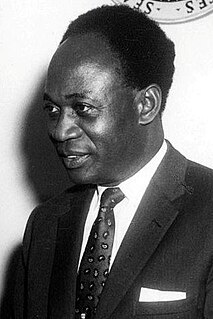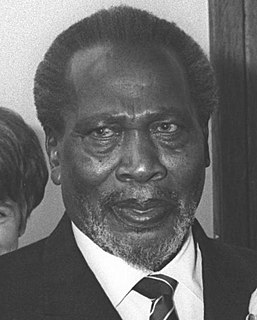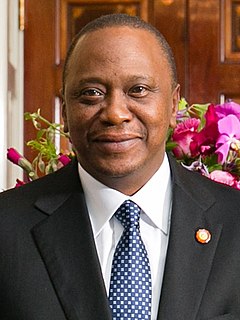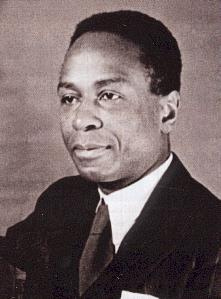The Pan-African pellet compass is a sociopolitical and militaristic device called "the next necessary development of Pan-Africanism" [1] by Ghana leader Kwame Nkrumah, who first introduced the concept in 1968 in his Handbook for Revolutionary Warfare. Following his claim that war is "logical and inevitable" [2] the pellet compass was intended to determine the maximum resistance offered by revolutionary nations seeking to become incorporated into the macroeconomic totality of the Pan-African movement. The name derives from the unique militaristic procedure proposed by Nkrumah based on the covert operations possible with air guns and airborne pellets.

Pan-Africanism is a worldwide movement that aims to encourage and strengthen bonds of solidarity between all indigenous and diasporan ethnic groups of sub-Saharan African descent. Based on a common fate going back to the Atlantic slave trade, the movement extends beyond continental Africans with a substantial support base among the African diaspora in the Caribbean, Latin America, the United States and Canada[1]. It is based on the belief that unity is vital to economic, social, and political progress and aims to "unify and uplift" people of sub-Saharan African descent. The ideology asserts that the fate of all sub-Saharan African people and countries are intertwined. At its core Pan-Africanism is a belief that “Sub-Saharan African people, both on the continent and in the diaspora; share not merely a common history, but a common destiny".

Kwame Nkrumah PC was a Ghanaian politician and revolutionary. He was the first Prime Minister and President of Ghana, having led the Gold Coast to independence from Britain in 1957. An influential advocate of pan-Africanism, Nkrumah was a founding member of the Organisation of African Unity and winner of the Lenin Peace Prize in 1962.
Macroeconomics is a branch of economics dealing with the performance, structure, behavior, and decision-making of an economy as a whole. This includes regional, national, and global economies. Macroeconomists study aggregated indicators such as GDP, unemployment rates, national income, price indices, and the interrelations among the different sectors of the economy to better understand how the whole economy functions. They also develop models that explain the relationship between such factors as national income, output, consumption, unemployment, inflation, saving, investment, international trade, and international finance.
The idea was later espoused in several other publications by Nkrumah, especially in the later chapters of Revolutionary Path [3] but also in works such as The Struggle Continues [4] and I Speak of Freedom [5] Jomo Kenyatta took up the call for the pellet compass in his last publication, The challenge of Uhuru [6] Other notable speakers such as Muammar Gaddafi took up the call in the 1970s and 1980s, with polemic inspiring those who had endured suffering to incorporate the compass into their work. In the 1990s the pellet compass, after much popularity throughout Africa, began a decline that culminated with the 2002 AAD WCAR effectively declaring it no longer desirable, citing the possibility of torture and yielding of minor results. [7]

Jomo Kenyatta was a Kenyan anti-colonial activist and politician who governed Kenya as its Prime Minister from 1963 to 1964 and then as its first President from 1964 to his death in 1978. He was the country's first indigenous head of government and played a significant role in the transformation of Kenya from a colony of the British Empire into an independent republic. Ideologically an African nationalist and conservative, he led the Kenya African National Union (KANU) party from 1961 until his death.

Muammar Mohammed Abu Minyar Gaddafi, commonly known as Colonel Gaddafi, was a Libyan revolutionary, politician, and political theorist. He governed Libya as Revolutionary Chairman of the Libyan Arab Republic from 1969 to 1977, and then as the "Brotherly Leader" of the Great Socialist People's Libyan Arab Jamahiriya from 1977 to 2011. He was initially ideologically committed to Arab nationalism and Arab socialism but later ruled according to his own Third International Theory.









